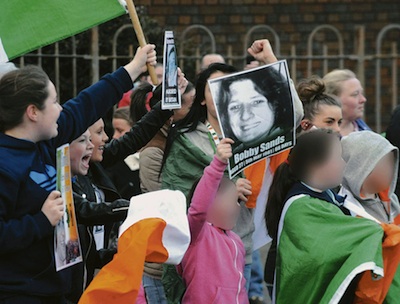
There were street parties in Derry and Belfast following news of the death of former British Prime Minister Margaret Thatcher this week. A crowd, many waving flags or holding posters to remember the 1981 hunger strikers, gathered at Free Derry Corner in the city’s Bogside. Crowds also gathered on the Falls Road in west Belfast as a cavalcade of cars, many decorated with Irish flags, travelled from the Twinbrook Estate to Divis Tower on Tuesday evening.
Over a hundred people waved flags and honking horns. A similar crowd crowd assembled on the streets of the Lower Falls on Monday night, where music was also played.
Associated with one of the bloodiest chapters of British oppression in Ireland, she became a hate figure not only for Irish republicans but also for many other groups across Britain and the rest of world.
Sinn Féin’s controversial Deputy First Minister Martin McGuinness had urged republicans to “resist” the temptation to celebrate her death. He said: “I think it’s wrong for people to be celebrating the death of anyone. I was no friend of Margaret Thatcher and she wasn’t a peacemaker, but we all have to recognise that we do damage to ourselves if we lower ourselves to those depths.”
But there had long been plans to celebrate the demise of a British Prime Minister who was synonymous with brutal class warfare at home and murderous colonial policies abroad.
A crowd of several hundred assembled in Glasgow’s George Square where in 1989 protests to the introduction of Thatcher’s hated poll tax took place. Some wore party hats and launched streamers into the air while a bottle of champagne was opened. Hundreds also gathered in Brixton, south London - the scene of fierce riots in 1981.
On the internet, an online campaign has driven sales of ‘Ding Dong The Witch Is Dead’, and midweek placings released by the Official Charts Company show Judy Garland’s version is now in the top five.
Left-wing British MP George Galloway tweeted “Tramp the dirt down” - the name of a famous song by pop star Elvis Costello, which first mentioned stamping on Thatcher’s grave.
Apparently angered by the celebrations, loyalists took to the streets for the first time in weeks with a renewal of the flags protests. And despite the announcement that the British flag would fly at half-mast over Belfast city hall for Thatcher’s funeral, there was a further demonstration in east Belfast on Tuesday night.
In Dublin, Fine Gael leader Enda Kenny infuriated many when he said he was “saddened” at Thatcher’s passing and claimed she had advanced the peace process by signing the Anglo-Irish Agreement in 1985.
However, former 26-County Taoiseach Bertie Ahern said he believed “nothing was achieved” towards peace in Ireland during Thatcher’s reign. “As De Valera said about Churchill, she was good for the UK, but her policies were not good for Ireland,” said Mr Ahern.
eirigi said that her death would not signal an end to the “damaging policies” she introduced and implemented in Ireland, Britain or elsewhere around the globe.
“In Ireland, most people will remember Thatcher as the person who condemned Republican prisoners to death on hunger-strike in 1981. But, the truth is, she represented much more than that.
“Margaret Thatcher viewed the Six County statelet as a colony of Britain and treated it with the same disdain and contempt that all imperialists have for their territorial possessions and for all those who reside therein.”
A brother of Derry hunger striker Patsy O’Hara has said his legacy will outlive that of Thatcher, who he branded a “warmonger”.
“Not only did she pursue a policy of war in Ireland but she also did across the world in the Malvinas. She rejected pleas for peace and for the lives of the hunger strikers made by Cardinal O’Fiach and Bishop Daly,” he added.
Mr O’Hara also said British policy in the North, as directed by Thatcher, had failed.
“She thought she could break the prisoners and criminalise the struggle for Irish freedom but my brother Patsy, and his nine comrades and all the other prisoners who took part in the protests showed her it could not be done.
“That is what people around the world will remember,” he said.
![[Irish Republican News]](https://republican-news.org/graphics/title_gifs/rn.gif)
![[Irish Republican News]](https://republican-news.org/graphics/title_gifs/harp.gif)

